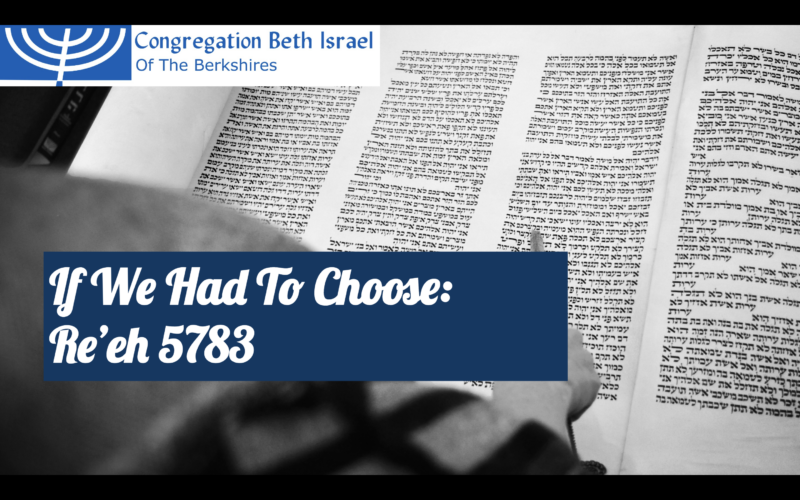רְאֵ֗ה אָנֹכִ֛י נֹתֵ֥ן לִפְנֵיכֶ֖ם הַיּ֑וֹם בְּרָכָ֖ה וּקְלָלָֽה׃ אֶֽת־הַבְּרָכָ֑ה אֲשֶׁ֣ר תִּשְׁמְע֗וּ אֶל־מִצְות֙ יְהֹוָ֣ה אֱלֹֽהֵיכֶ֔ם אֲשֶׁ֧ר אָנֹכִ֛י מְצַוֶּ֥ה אֶתְכֶ֖ם הַיּֽוֹם׃ וְהַקְּלָלָ֗ה אִם־לֹ֤א תִשְׁמְעוּ֙ אֶל־מִצְות֙ יְהֹוָ֣ה אֱלֹֽהֵיכֶ֔ם וְסַרְתֶּ֣ם מִן־הַדֶּ֔רֶךְ אֲשֶׁ֧ר אָנֹכִ֛י מְצַוֶּ֥ה אֶתְכֶ֖ם הַיּ֑וֹם לָלֶ֗כֶת אַחֲרֵ֛י אֱלֹהִ֥ים אֲחֵרִ֖ים אֲשֶׁ֥ר לֹֽא־יְדַעְתֶּֽם׃See, this day I set before y’all blessing and curse: blessing, if y’all obey the mitzvot of your God that I enjoin upon you this day; and curse, if y’all do not obey the mitzvot of your God, but turn away from the path that I enjoin upon y’all this day and follow other gods whom y’all have not experienced. (Deut. 11:26-28)
That’s the beginning of this week’s Torah portion, Re’eh. The Italian rabbi and physician Ovadia ben Jacob Sforno, born in 1475, writes:
ראה, pay good attention so that you will not be like the nations of the world who relate to everything half-heartedly, always trying to find middle ground. Remember that אנכי נותן לפניכם היום ברכה וקללה, I present you this day with the choice of two extremes, opposites. The ברכה / brakha is an extreme in that it provides you with more than you need, whereas the קללה / klalah is another extreme making sure that you have less than your basic needs. You have the choice of both before you; all you have to do is make a choice.
I’m fascinated by the Sforno’s admonition. I usually think of middle ground as a positive thing. Compromise, moderation, finding the balance between the two poles — that’s good, right? Living in community requires compromise. The capacity to make peace and find middle ground seems like a good thing. But what I hear the Sforno to be saying is: sometimes seeking middle ground isn’t right.
I hear the Sforno to be saying: don’t be wishy-washy. We shouldn’t “both-sides” everything. There’s actually a difference between brakha and klalah, blessing and curse, right and wrong. When it comes to making an ethical choice between what’s right and what’s wrong, it’s our job to know the difference. When it comes to right and wrong, defaulting to some imagined middle ground helps no one.
Looking at the world around us, this feels resonant. We’re faced with ethical choices all the time. We can uphold the truth, or we can shrug off lies. We can learn from our nation’s flawed and messy history, or we can pretend slavery wasn’t so bad. We can ensure that every American can exercise their right to vote, or we can ignore when a state party leadership simply refuses to redraw gerrymandered maps.
We can protect human rights and dignity, or we can let lgbtq rights be eroded as in many states (now also at risk federally). We can uplift diverse voices, or we can ignore the banning of books relating to race, gender, sexual orientation, and history, including books about the Holocaust. We can seek climate resiliency, or we can ignore the hottest month on record and the hundred-degree oceans.
On a smaller scale we can give each other the benefit of the doubt, or we can assume the worst of each other. We can speak with each other, or we can speak about each other. We can be curious and open about what’s going on with each other, or we can make assumptions. And this too ties back to the “blessing or curse” paradigm that Torah gives us, because our relationships can feel like either one.
“The power to choose doesn’t mean that every choice is equally wise… We can choose to let the elderly homeless remain on the streets. We have that power,” notes R. Bradley Shavit Artson. He doesn’t need to add that if we can make that lousy choice, we also could choose to house the homeless and to feed the hungry. We can choose to take care of each other, or to say that others’ needs aren’t our problem.
Every year, including this one, we read these verses just before the Days of Awe. The new year begins five weeks from tonight, so new beginnings and existential choices may already be on our minds. But I think the choice between brakha and klalah is always in front of us. And this year, the Sforno’s words remind me that equivocating, or opting not to choose, is also a choice… it’s just not a very good one.
There’s a grammatical oddity in the first verse of the parsha. “See, this day I set before y’all blessing and curse” — the instruction “See” is written in the singular, while “before y’all” and the rest of the verse is written in the plural. The opening word is spoken to each of us individually, a reminder that Torah speaks to each of us where we are. But the blessings and curses arise out of our communal choices.
The blessings and curses are aggregate. They impact the community as a whole. And they ask something of the community as a whole. If we want the coming year to be one of justice, we need to enact it together, because one person acting justly alone can’t create justice. If we want the coming year to be one of concern for the needs of others, we need to live out that concern and act on it together.
What are the values we want to animate us in the CBI community in the coming year? In our towns? Across our state and the neighboring ones? In our nation? The choices we make together can bring blessing or curse, a welcome or a closed door, hope or despair, abundance or lack. I think we all know which is the world we want to live in. Now we just have to make that world real for everyone.
This is the d’varling that Rabbi Rachel offered at Kabbalat Shabbat services (cross-posted to Velveteen Rabbi.)





